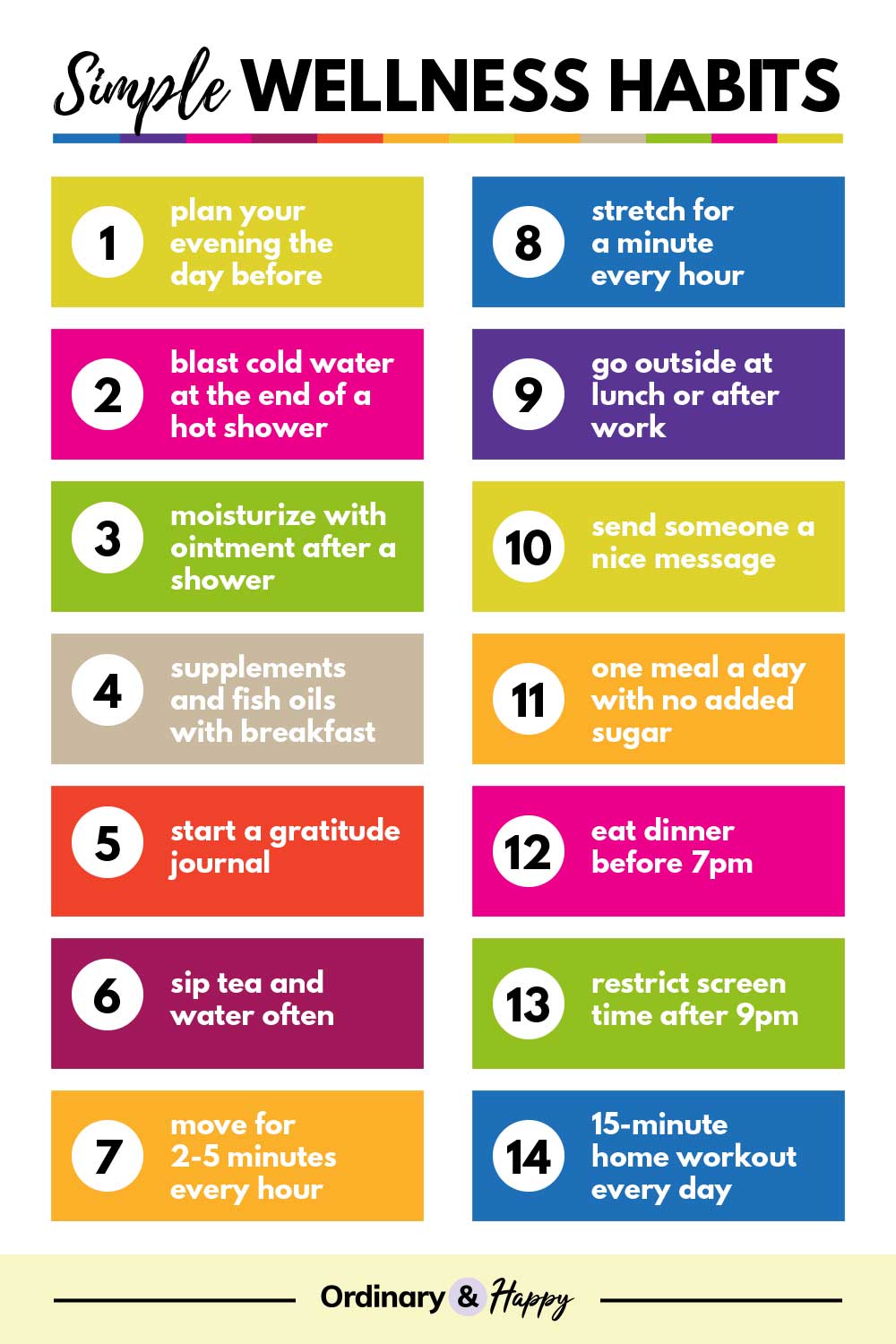“Healthy Habits for Everyday Life: A Guide to Well-being
With excitement, let’s uncover the fascinating topic of Healthy Habits for Everyday Life: A Guide to Well-being. Come along as we weave together engaging insights and offer a fresh perspective to our readers.
About Video Healthy Habits for Everyday Life: A Guide to Well-being
Healthy Habits for Everyday Life: A Guide to Well-being

In the hustle and bustle of modern life, it’s easy to let healthy habits fall by the wayside. However, prioritizing well-being is an investment in your long-term happiness, productivity, and overall quality of life. Incorporating healthy habits into your daily routine doesn’t have to be a monumental task. Small, consistent changes can lead to significant improvements in your physical, mental, and emotional health. This comprehensive guide will explore a range of healthy habits you can integrate into your everyday life.
1. Nourish Your Body with a Balanced Diet
-
Focus on Whole Foods: Base your diet on whole, unprocessed foods like fruits, vegetables, lean proteins, and whole grains. These foods are packed with essential nutrients, fiber, and antioxidants.
-
Prioritize Protein: Protein is crucial for muscle repair, satiety, and overall health. Include sources like chicken, fish, beans, lentils, tofu, or Greek yogurt in your meals.

Embrace Healthy Fats: Don’t shy away from healthy fats found in avocados, nuts, seeds, olive oil, and fatty fish. These fats support brain health, hormone production, and nutrient absorption.
-
Limit Processed Foods, Sugar, and Unhealthy Fats: Minimize your intake of processed foods, sugary drinks, and foods high in saturated and trans fats. These can contribute to weight gain, inflammation, and chronic diseases.
-
Hydrate Adequately: Drink plenty of water throughout the day to stay hydrated. Water is essential for digestion, circulation, and overall bodily functions. Aim for at least eight glasses a day, and increase your intake during exercise or hot weather.

2. Move Your Body Regularly

-
Find Activities You Enjoy: Exercise shouldn’t feel like a chore. Explore different activities until you find something you genuinely enjoy, whether it’s dancing, hiking, swimming, cycling, or team sports.
-
Aim for Moderate-Intensity Exercise: The Centers for Disease Control and Prevention (CDC) recommends at least 150 minutes of moderate-intensity aerobic exercise or 75 minutes of vigorous-intensity exercise per week.
-
Incorporate Strength Training: Strength training is essential for building muscle mass, boosting metabolism, and improving bone density. Aim for at least two strength training sessions per week, targeting all major muscle groups.
-
Break Up Sedentary Time: If you have a desk job, make an effort to stand up and move around every 30 minutes. Take short walks, stretch, or do some simple exercises at your desk.
-
Make Exercise a Habit: Schedule exercise into your calendar and treat it like any other important appointment. Find an exercise buddy to stay motivated and accountable.
3. Prioritize Sleep
-
Establish a Regular Sleep Schedule: Go to bed and wake up at the same time every day, even on weekends, to regulate your body’s natural sleep-wake cycle.
-
Create a Relaxing Bedtime Routine: Wind down before bed with calming activities like reading, taking a warm bath, or listening to soothing music.
-
Optimize Your Sleep Environment: Make sure your bedroom is dark, quiet, and cool. Use blackout curtains, earplugs, or a white noise machine to minimize distractions.
-
Avoid Screens Before Bed: The blue light emitted from electronic devices can interfere with sleep. Avoid using smartphones, tablets, and computers for at least an hour before bed.
-
Limit Caffeine and Alcohol: Caffeine and alcohol can disrupt sleep patterns. Avoid consuming these substances close to bedtime.
4. Manage Stress Effectively
-
Practice Mindfulness and Meditation: Mindfulness and meditation can help you become more aware of your thoughts and feelings, reducing stress and promoting relaxation.
-
Engage in Relaxation Techniques: Try relaxation techniques like deep breathing, progressive muscle relaxation, or guided imagery to calm your mind and body.
-
Spend Time in Nature: Spending time in nature has been shown to reduce stress, improve mood, and boost overall well-being.
-
Connect with Loved Ones: Social support is crucial for managing stress. Spend time with friends and family, and talk about your feelings.
-
Set Realistic Goals and Boundaries: Avoid overcommitting yourself and learn to say no to requests that will add unnecessary stress to your life.
5. Nurture Your Mental and Emotional Well-being
-
Practice Gratitude: Take time each day to appreciate the good things in your life. Keep a gratitude journal or simply reflect on what you’re thankful for.
-
Engage in Activities You Enjoy: Make time for hobbies and activities that bring you joy and relaxation.
-
Learn New Skills: Learning new skills can boost your confidence, expand your horizons, and keep your mind sharp.
-
Practice Self-Compassion: Treat yourself with kindness and understanding, especially during difficult times.
-
Seek Professional Help When Needed: Don’t hesitate to seek professional help if you’re struggling with mental health issues. A therapist or counselor can provide support and guidance.
6. Stay Hydrated
-
Carry a Water Bottle: Having a water bottle with you throughout the day serves as a constant reminder to drink.
-
Set Reminders: Use your phone or an app to set reminders to drink water at regular intervals.
-
Drink Water Before Meals: Drinking a glass of water before meals can help you feel fuller and prevent overeating.
-
Infuse Your Water: Add fruits, vegetables, or herbs to your water to make it more flavorful and appealing.
-
Choose Water Over Sugary Drinks: Opt for water over sugary drinks like soda, juice, and sweetened tea.
7. Practice Good Hygiene
-
Wash Your Hands Frequently: Wash your hands thoroughly with soap and water for at least 20 seconds, especially after using the restroom, before eating, and after being in public places.
-
Maintain Oral Hygiene: Brush your teeth twice a day and floss daily to prevent cavities and gum disease.
-
Shower Regularly: Shower or bathe regularly to keep your skin clean and healthy.
-
Wear Clean Clothes: Wear clean clothes every day to prevent the spread of germs.
-
Clean Your Living Space: Keep your home clean and tidy to reduce allergens and create a more pleasant environment.
8. Limit Screen Time
-
Set Time Limits: Use apps or built-in features on your devices to set time limits for social media, games, and other distracting apps.
-
Designate Screen-Free Zones: Create screen-free zones in your home, such as the bedroom or dining room.
-
Take Breaks: Take regular breaks from screens to rest your eyes and stretch your body.
-
Engage in Offline Activities: Find hobbies and activities that don’t involve screens, such as reading, spending time outdoors, or socializing with friends.
-
Be Mindful of Your Screen Usage: Pay attention to how much time you’re spending on screens and how it’s affecting your mood and productivity.
9. Foster Positive Relationships
-
Spend Quality Time with Loved Ones: Make time for meaningful interactions with family and friends.
-
Communicate Effectively: Practice active listening and express your thoughts and feelings in a clear and respectful manner.
-
Show Appreciation: Express gratitude to the people in your life who support and care for you.
-
Set Boundaries: Establish healthy boundaries in your relationships to protect your time, energy, and emotional well-being.
-
Resolve Conflicts Constructively: Address conflicts in a calm and respectful manner, focusing on finding solutions that work for everyone involved.
10. Set Goals and Pursue Your Passions
-
Identify Your Values: Determine what’s important to you in life and set goals that align with your values.
-
Break Down Goals into Smaller Steps: Divide large goals into smaller, more manageable steps to make them less daunting.
-
Create a Plan: Develop a plan of action for achieving your goals, including timelines and milestones.
-
Take Consistent Action: Take small steps every day towards your goals, even if it’s just for a few minutes.
-
Celebrate Your Successes: Acknowledge and celebrate your achievements along the way to stay motivated.
Conclusion
Adopting healthy habits is a journey, not a destination. Start by incorporating a few small changes into your daily routine and gradually build from there. Be patient with yourself, and don’t get discouraged if you slip up occasionally. The key is to be consistent and to prioritize your well-being. By making healthy habits a part of your everyday life, you’ll reap the rewards of improved physical, mental, and emotional health, leading to a happier, more fulfilling life.

